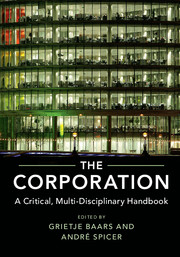Book contents
- Frontmatter
- Contents
- List of Contributors
- Acknowledgements
- Introduction: Why the Corporation?
- PART I DISCIPLINARY OVERVIEWS
- PART II INTERDISCIPLINARY THEMATIC CHAPTERS
- 1 The Evolution of the Corporate Form
- a Between Company and State: The Dutch East and West India Companies as Brokers between War and Profit
- b Early Modern Business Projects and a Forgotten History of Corporate Social Responsibility
- c Finance and the Origins of Modern Company Law
- 2 The Multinational Corporate Group
- 3 The Financialization of the Corporation
- 4 Corporate Value Chains
- 5 Corporate Citizenship
- 6 The Corporation and Crime
- 7 The Corporation and Ideology
- 8 Corporation and Communities
- 9 Corporations and Resistance
- 10 Alternatives to the Corporation
- Index
- References
a - Between Company and State: The Dutch East and West India Companies as Brokers between War and Profit
from 1 - The Evolution of the Corporate Form
Published online by Cambridge University Press: 31 March 2017
- Frontmatter
- Contents
- List of Contributors
- Acknowledgements
- Introduction: Why the Corporation?
- PART I DISCIPLINARY OVERVIEWS
- PART II INTERDISCIPLINARY THEMATIC CHAPTERS
- 1 The Evolution of the Corporate Form
- a Between Company and State: The Dutch East and West India Companies as Brokers between War and Profit
- b Early Modern Business Projects and a Forgotten History of Corporate Social Responsibility
- c Finance and the Origins of Modern Company Law
- 2 The Multinational Corporate Group
- 3 The Financialization of the Corporation
- 4 Corporate Value Chains
- 5 Corporate Citizenship
- 6 The Corporation and Crime
- 7 The Corporation and Ideology
- 8 Corporation and Communities
- 9 Corporations and Resistance
- 10 Alternatives to the Corporation
- Index
- References
Summary
Introduction
The roots of the modern corporation lie in the violent global expansion of European merchant capital during the early-modern period. The ways in which this reality shaped the concrete evolution of the company form have remained puzzling for historians and theorists of the corporation alike. This is especially true for the Dutch United East India Company (VOC). On the one hand, later observers have often been captivated by the precociously modern features of this enterprise; a ‘permanent capital, legal personhood, separation of ownership and management, limited liability for shareholders and for directors, and tradable shares’ (Gelderblom et al., 2013: 1050–1051). On the other hand, the political nature of the company's constitution, the state-like features that it attained in Asia, and the precarious balance that it maintained between trade and warfare in the eyes of many prove that the VOC firmly belonged to a pre-modern, or even pre-capitalist past. This holds even stronger for the VOC's West-Indian counterpart, the West India Company (WIC). This company was even more invested in military rivalry between European Atlantic empires, a competition that centred on the inherently violent trans-Atlantic slave trade and the maintenance of control over slave societies. Overall, these companies have been treated as bodies with two souls: one the precursor of nineteenth-century imperialism, the other the multinational of the age of globalization. According to one prominent Dutch historian, ‘the VOC offers the strange image of a hybrid political-economic organization’ (van Goor, 2002: 27).
Designating the combination of economic and political imperatives that drove the early-modern chartered companies as ‘strange’, however, rests on the fundamental assumption that the apparent separation of politics and economics in the constitution of the modern capitalist corporation is both real in the present and the natural outcome of historical development. A critical approach to the corporation should reject both premises. This fundamental theoretical problem has a direct bearing on the arguments surrounding the Dutch VOC in particular. For liberal observers from Adam Smith onwards, the violence written into the early-modern company charters as well as their monopoly rights sharply separated them from the modern, non-political, free-trade-oriented corporation. This approach is still shared by many who work within the framework of new institutional economics that has dominated the writing of economic history in the past few decades.
- Type
- Chapter
- Information
- The CorporationA Critical, Multi-Disciplinary Handbook, pp. 215 - 225Publisher: Cambridge University PressPrint publication year: 2017



